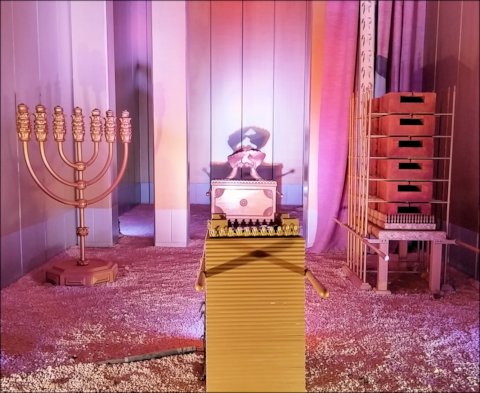For the week of February 13, 2016 / 4 Adar 5776

Within the full-scale replica of the Mishkan at Hotel Eshel Hashomron, Ariel, Samaria. Photo: Alan Gilman
Terumah
Torah reading: Shemot/Exodus 25:1 – 27:19
Haftarah: 1 Melachim/Kings 5:26 – 6:13
Download Audio [Right click link to download]
And let them make me a sanctuary, that I may dwell in their midst. Exactly as I show you concerning the pattern of the tabernacle, and of all its furniture, so you shall make it. (Shemot/Exodus 35:8-9)
This week’s reading begins the instructions for the building of the Mishkan (English: Tabernacle). Mishkan means dwelling place, for this centrally located mobile complex was to signify the presence of God among the people of Israel. That it is described as a sanctuary in the selection I just read is probably not a surprise to most readers, since it is common even today to refer to a place of worship as such. But what does sanctuary mean?
I think when most people hear the word sanctuary, they immediately think of what Merriam-Webster’s dictionary lists as a common definition: “a place where someone or something is protected or given shelter.” A safe place in other words. Perhaps that is rooted in the custom of people finding protection from accusations and revenge by running to the Mishkan or later the Temple and holding the horns of the alter located there (see 1 Kings 1:50; 2:28). But shelter and protection were not central to the Mishkan’s purpose.
The Hebrew word for sanctuary here is “mikdash” which is derived from “kadash,” meaning to set apart or make holy. The Mishkan was to be a holy place, a structure designed to be set apart for God. Whatever might result from the Mishkan’s being a sanctuary, it is first and foremost God’s place. This is where God would be encountered, served, and from where his ways would be taught. It would be so, because God himself would be present. Therefore, a mikdash, a sanctuary, is where God’s presence dwells.
Where do we find sanctuary today? The Mishkan and Temple have long been destroyed. Millions of people gather at the Western Wall in Jerusalem to get as close as possible to the Temple’s location. For many this expresses a desire to be near to God’s presence. Synagogues and churches refer to their main meeting and prayer halls as sanctuaries, for it is in these locals that the community gathers to meet God in a special way, similar to the Mishkan and Temple. But he is in none of these places, at least not in the manifest way he was in ancient times.
That doesn’t mean that true sanctuary no longer exists. Far from it! Because of the coming of the Messiah, that which at one time dwelt within the confines of the Mishkan or the Temple is now present within his people both individually (see 1 Corinthians 3:17) and corporately (see 1 Corinthians 3:17).
If you truly know God through Yeshua the Messiah, you are God’s sanctuary. He who dwelt in the Mishkan of old now dwells in you. And if you are God’s sanctuary, his mikdash, then you are his holy place, set apart by him and for him. It is in and through you and others like you that he desires to manifest his presence and make himself known by his word and his power. The so-called sanctuaries of our houses of worship can be nothing of the kind unless filled with God’s faithful people. But when they are, they too become God’s true sanctuary.
It is time for Yeshua’s followers to realize our special function in the world. We don’t simply represent a far-off, detached Supreme Being that people need to know about. He has taken up residence in us, so that when people encounter us they should be encountering their Creator, Lord, Judge, and would-be Savior. We are the bridge through which God seeks to access a lost and confused world. We therefore must be diligent to prevent any barriers to form preventing people from seeing him in us. But please don’t ask God to take you out of the way, for it is you he has chosen through whom to make himself known.
All scriptures, English Standard Version (ESV) of the Bible
